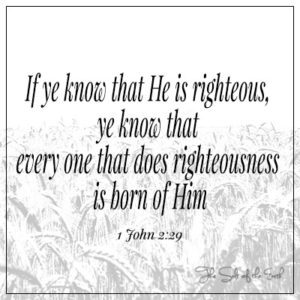When Jesus and Barabbas were led before the people of Israel, the people were given a choice to release Jesus or Barabbas. The people choose to release Barabbas. Through the influence of the (religious) leaders of the people, the people didn’t choose for the good and for righteousness by releasing the innocent Man Jesus Christ, but they chose for evil and unrighteousness, by releasing the guilty prisoner Barabbas, who was a thief and murderer and deserved the death sentence. And so the guilty Barabbas, who deserved to be crucified was released and the innocent Jesus was scourged and crucified(Mattheu 27:15-26, Tšoaea 15:6-15, Luka 23:13-25, Johanne 18:38-40).
There are many aspects to this event, including the following two, namely, that the people were influenced by the (religious) leaders and therefore chose evil instead of good and released the criminal; the sinner, and judged the Righteous, and that Jesus Christ took the place of the prisoner Barabbas, the sinner; the transgressor of the law, who deserved to be crucified and took the punishment upon Himself, while Barabbas was released.
Jesus or Barabbas?
Now at that feast he released unto them one prisoner, whomsoever they desired. And there was one named Barabbas, which lay bound with them that had made insurrection with him, who had committed murder in the insurrection. And the multitude crying aloud began to desire him to do as he had ever done unto them. But Pilate answered them, ho bua, Will ye that I release unto you the King of the Jews? For he knew that the chief priests had delivered Him for envy. But the chief priests moved the people, that he should rather release Barabbas unto them. And Pilate answered and said again unto them, What will ye then that I shall do unto him whom ye call the King of the Jews? And they cried out again, Crucify Him. Then Pilate said unto them, Why, what evil hath He done? And they cried out the more exceedingly, Crucify Him. And so Pilate, willing to content the people, released Barabbas unto them, and delivered Jesus, when he had scourged Him, to be crucified (Tšoaea 15:6-15)
Ho na le batho, who don’t understand that when God’s people were given a choice between the releasing of Jesus or Barabbas, the people chose to release the guilty prisoner Barabbas, whose name means son of a father or teacher, instead of releasing the innocent Man Jesus Christ, and point with a judgmental finger to the people.
But isn’t it so, that in our age many do exact the same thing and reject Jesus Christ; Lentswe, and chose the sinner and sin through the influence of the words of the devil and by believing and following his words and do the works of the flesh and approve of sin?
They don’t choose to submit to God and walk in obedience to the Word after the Spirit in the will of God and do righteous works, but they reject the words of God and chose to walk after the will, ditakatso, and desires of the flesh and do the works of the flesh and persevere in sin.
And so many approve of sin and/or persevere in sin
God is light and in Him is no darkness
This then is the message which we have heard of Him, and declare unto you, that God is light, and in Him is no darkness at all. If we say that we have fellowship with Him, and walk in darkness, we lie, and do not the truth: But if we walk in the light, as He is in the light, we have fellowship one with another, and the blood of Jesus Christ His Son cleanses us from all sin (1 Johanne 1:5-7)
Whosoever committeth sin transgresseth also the law: for sin is the transgression of the law. And ye know that He was manifested to take away our sins; and in Him is no sin. Whosoever abideth in Him sinneth not: whosoever sinneth hath not seen Him, neither known Him (1 Johanne 3:4-6).
But everyone, who is born of God and has received His nature and belongs to Him, should not walk in darkness and persevere in sin. Because in Him is no darkness and if we are in Him, then shall there be no darkness in us and we shall not do the works of darkness.
Bohle, who persevers in sin walks in darkness and not in the light.
If someone says to walk in the light, but do the works of the flesh and doesn’t repent, then the unrighteous works of the person show that the person belongs to the world; mmuso wa lefifi, and not to Jesus Christ and the Kingdom of God (1 Johanne 1:5-11).
Lentswe le re, that God has not called us unto uncleanness, empa khalalelong. Eena, therefore, that despises, despises not man, empa Modimo, who has also given unto us His Holy Spirit (1 Bathesalonika 4:7)
When you refuse to submit to God’s Word and His will and keep living in uncleanness; sin and iniquity, then you shall not be any different from the world. Hobane tseo, who belong to the world, belong to the generation of fallen man and walk as enemies of God and His Word as transgressors of the law of God in darkness and live after the flesh in uncleanness (Bala hape: ‘If Christians live like the world of what should the world repent off?‘).
He that does righteous is righteous, even as He is righteous, but he that commits sin is of the devil for the devil sinned from the beginning
Little children, let no man deceive you: he that doeth righteousness is righteous, even as He is righteous. He that committeth sin is of the devil; for the devil sinneth from the beginning. For this purpose the Son of God was manifested, that He might destroy the works of the devil. Whosoever is born of God doth not commit sin; for His seed remaineth in him: and he cannot sin, because he is born of God. In this the children of God are manifest, and the children of the devil: whosoever doeth not righteousness is not of God, neither he that loveth not his brother (1 Johanne 3:7-10)
And so many believe the lies of the darkness and chose to submit to the sinful nature of the flesh and obey the will of the flesh and do the works of darkness, whereby they obey their father, diabolose, who is a transgressor of the law of God and a liar, a thief, and a murderer.
Instead of choosing Jesus Christ; Lentswe, and obeying the Word and doing the Word, they choose and obey the devil and the sinful flesh and because of that, they show that they love sin and death rather than righteousness and life.
This not only happens in the lives of many believers, but also in the lives of many preachers, sebakeng se seng, and leaders of churches, who suppose to be born again and spiritual and ought to walk as mature sons of God after the Spirit in de will of God, empa ho e-na le hoo, they carnal and walk after the flesh and do the will, ditakatso, and desires of the flesh and a.o. lie, cheat, steal, drink, get involved with sexual uncleanness, bohlola, commit adultery, le tlhalo and act like it’s all normal.
And if they are caught and people address their behavior and confront them with their deeds, their acting talents arise and they show some remorse and repent and are believed by the people and are restored and after a while, they revert to the same behavior and commit the same sin again and walk the same road as before, whereby they not only defile and damage the church, but also make a mockery of the gospel of Jesus Christ and crucify Jesus Christ again(Bala hape: ‘Na u ka boela ua thakhisa Jesu ‘me ua mo hlabisa lihlong pepeneneng?‘, ‘‘Lay hands suddenly on no man, what did Paul mean by that?, le ‘Can you be complicit with the sin of fellow believers?‘).
Many churches have become indifferent towards sin
Many churches have become indifferent towards sin and approve of sin in the church and allow the people to walk in sin and/or fall back into the same sin over and over again, even if they are in ministry.
Instead of condemning the sin and acting according to the Word and calling to repentance and the removal of sin, they condemn the believers of the church, who obey the Word and condemn sin, and to substantiate it, they use some pious words and subjects from the Bible, which are taken out of context, like false love, the grace, and forgiveness (Bala hape: ‘What does it mean to deliver a person unto satan?', ‘What is false love?’ and ‘Lost in the sea of grace’).
And so they turn evil into good and good into evil and because of their carnal humanistic behavior, they reject the Word and turn the truth of God into a lie and worship and serve the sinner and their sins and give power to the devil, who continues his destructive work.
The grace of God is not a permit to sin
Re tla reng he? Na re tla tswela pele dibeng, hore mohau o tle o ate? Molimo ha ho joalo. Re tla etsa jwang, ba shweleng sebeng, phela ka ho sa feleng teng? Ha le tsebe, hore bohle ba kolobeleditsweng ho Jesu Kreste, re kolobeleditswe lefung la hae? (Baroma 6:1-3)
What then? shall we sin, because we are not under the law, but under grace? Molimo ha ho joalo. Ha le tsebe, that to whom ye yield yourselves servants to obey, his servants ye are to whom ye obey; whether of sin unto death, or of obedience unto righteousness? (Baroma 6:15-16)
But Jesus has not taken man’s place on the cross, so that man could remain living in sin. The grace of God and the blood of Jesus Christ are not a permit to persevere in sin.
Just like sin reigned as king unto death in the old man, the grace reigns through righteousness in the new man unto eternal life by Jesus Christ and His perfect work of redemption.
Jesus has taken the place of (fallen) man on the cross, so that through regeneration in Christ; the death of the flesh and the resurrection from the spirit from the dead, (fallen) man would be healed (made whole, reconciled) and be truly free. Reconciled with God and free from the power of sin, free from the authority of the devil and the kingdom of darkness, where death reigns.
Just like what happened to Barabbas, the thief, and murderer. The sinner, the transgressor of the law, who was found guilty and deserved the death penalty, was released and Jesus took the place of Barabbas and carried sin (transgression of the law) and the punishment for sin, which is the death.
Jesus Christ gave His life and died for mankind
But what nobody knew, was that Jesus not only took the place of Barabbas and carried the punishment for sin, which is death, but Jesus took the place of the whole human race.
Jesus Christ gave His own life and died on the cross for all those sinners, who were born of the seed of Adam and belonged to the generation of the old man, and by hearing the words of God and the confrontation with their sins and sinful nature and their state as sinner repent and lay down their own lives and follow Jesus Christ, the Son of God and the Living Word (Bala hape: ‘Motho o tlameha ho lefa theko!.').
Do you love Jesus Christ?
The thief cometh not, but for to steal, and to kill, and to destroy: I am come that they might have life, and that they might have it more abundantly (Johanne 10:10)
If ye love Me, keep My commandments (Johanne 14:15)
As the Father hath loved Me, so have I loved you: continue ye in My love. If ye keep My commandments, ye shall abide in My love; even as I have kept My Father’s commandments, and abide in His love (Johanne 15:9-10)
If you love Jesus Christ, you shall submit to Him and keep His commandments. Because Jesus says, that if you love Him you shall keep His commandments. And as long as you keep His commandments you will abide in His love.
But if your love for Jesus Christ becomes lukewarm and you don’t spend time with Him and don’t do what the Word says, but give priority to other things, it won’t take long before you will return to your old life and chose to please your flesh instead of the Spirit.
Jesus or Barabbas, who do you choose?
As soon as a person returns to his or her old life and listens to the carnal lusts and desires and is led by the poorly world spirits and does the works of the flesh, the person chooses to obey and serve the devil through sin and to reject Jesus Christ; Lentswe.
And so a person chooses the devil, who is a transgressor of the law; a thief and a murderer, above Jesus Christ, the Son of God and Giver of eternal life, and chooses death rather than life.
‘E be letsoai la lefatše’




